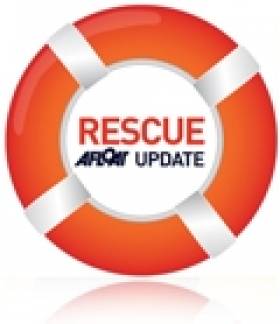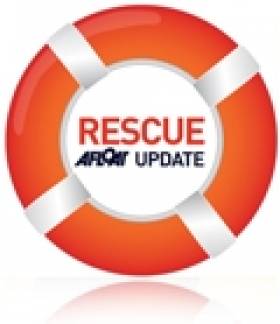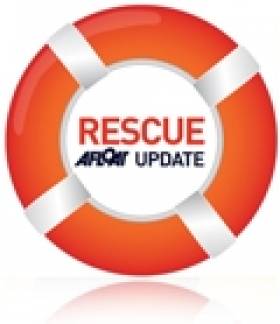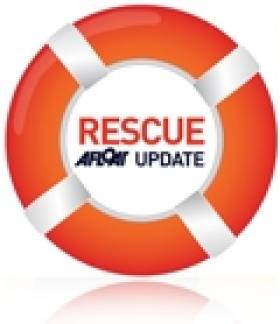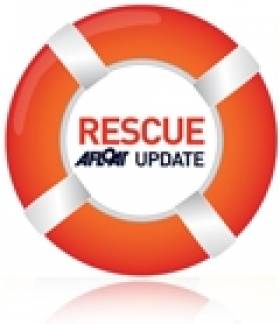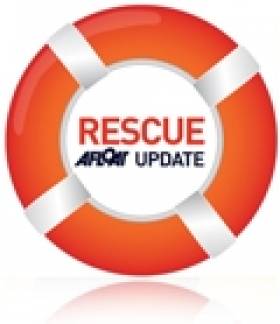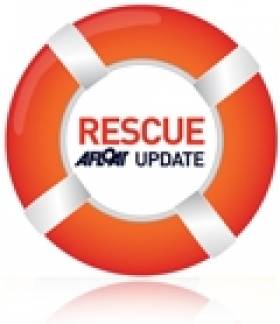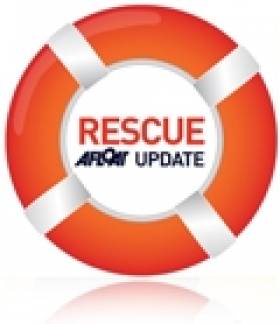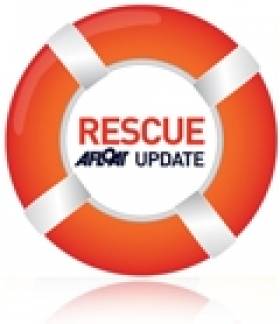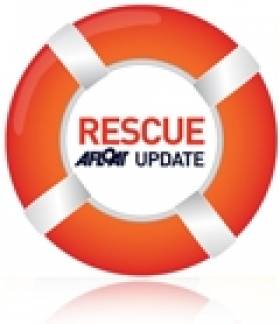Displaying items by tag: Rescue
Stricken Solent Car-Transporter 'Held' Overnight off Isle of Wight
#ShipGrounding – Car-transporter Hoegh Osaka was being held east of its grounding at Alpha Anchorage, between East Cowes and Lee-on-the-Solent, reports BBC News.
The cargo ship that has been stricken in the Solent since Saturday as previously reported on Afloat.ie, is being secured overnight after freeing itself from the sandbank.
Hoegh Osaka had run aground on Bramble Bank on Saturday.
It "refloated" itself unexpectedly just before 14:00 GMT due to the tide and water being pumped out of the ship.
The vessel was towed two miles east in the Solent and will be held by two tugs until Thursday for a full assessment by salvage company Svitzer.
For much more on this story including photos, click HERE
Injured Kayaker Recovered By Abseiling Rescuers In Clare Glens
#Rescue - An injured kayaker was recovered by mountain rescue volunteers who reached him by abseiling down a steep embankment in the Clare Glens, as The Irish Times reports.
The South Eastern Mountain Rescue personnel were described as heroes after the difficult rescue operation in the west Munster beauty spot yesterday afternoon (Sunday 4 January).
The casualty, a 26-year-old, was lifted to a waiting ambulance and hospitalised with a serious shoulder injury.
The Irish Times has more on the story HERE.
Investigation Into Listing Car-Transporter Begins
#Rescue - An investigation has begun into why the car transporter Hoegh Osaka which as previously reported, ran aground in the Solent last Saturday started to list shortly after departing the Port of Southampton.
According to the BBC, the Hoegh Osaka was deliberately run aground off the Isle of Wight on Saturday evening after it developed problems and started to list, the vessel's owners Hoegh Autoliners said.
The ship is now listing at 52 degrees and the salvage operation has begun.
All 25 crew members were rescued from the ship by the RNLI and coastguard.
Ingar Skiaker, chief executive of Hoegh Autoliners, said: "Our vessel developed a severe list shortly after she left port and the pilot and the master took the decision to save the vessel and its crew by grounding her on the bank.
"This showed great skill and seamanship on behalf of our crew when faced with such challenging circumstances.
"At this stage it is too early to speculate on the cause of the list but we are starting an immediate investigation.
For more on this story, click HERE.
25 Rescued As Car Transporter Lists In Solent
#Rescue - BBC News reports that the crew of a car transporter ship that ran aground on a sandbank in the Solent last night (Saturday 3 January) have been brought to safety.
One of the 25-strong crew was hospitalised with non life-threatening injuries after the Hoegh Osaka hit the Bramble Bank, due north of Cowes, around 9.30pm.
RNLI lifeboats from nearby Calshot, Cowes, Yarmouth and Southampton were joined by the Solent coastguard helicopter and a number of tugboats in the emergency response.
The 180m vessel is currently listing at a 45 degree angle, but it is not taking on water and is expected to be refloated.
The Bramble Bank, or Brambles, where the ship ran aground, is well known for the annual cricket match that takes place there when uncovered by low spring tides.
#Rescue - Casualties in remote or unfamiliar locations can now be found and treated quicker than ever before thanks to a new software solution for smartphones developed by the Air Corps and the HSE.
The video report from RTÉ News above details the LocateMe112 system, designed by helicopter pilot Lt Colin Gallagher, which enables the GPS chip on an emergency caller's smartphone to be activated remotely – via a link sent via SMS – by rescue services, who can then pin-point the exact location of the injured person.
The key feature of LocateMe112 is that it doesn't require the installation of an app, only needing the caller to have a smartphone with location services turned on.
The application is being co-ordinated by the National Aeromedical Co-ordination Centre and is available to agencies across Ireland including the HSE and the Irish Coast Guard.
And since its introduction late last year, the Irish Air Corps says LocateMe112 has been used to great success.
Mediterranean Ferry With 466 Passengers 'Evacuated' After Fire
#Rescue - Some 466 people were being evacuated this morning from a car ferry that reported a fire on board while sailing from Greece to Italy this morning, according to RTÉ News.
As of 8am this morning Irish time, 130 people had been moved from the Norman Atlantic via a rescue boat to a nearby container ship some 44 nautical miles west of Corfu.
Passengers have described a lack of co-ordination in the evacuation effort since the fire broke out at 4am Irish time.
"They tried to lower some boats, but not all of us could get in," one person claiming to be a passenger told a Greek TV station by phone.
And as The Irish Times reports, poor weather in the area - with wind speeds of up to 88km per hour - has made the rescue effort "complicated".
“We are doing everything we can to save those on board and no one, no one will be left helpless in this tough situation,” said Greek shipping minister Miltiadis Varvitsiotis.
The incident comes almost three years after the wrecking of the Costa Concordia in the waters off western Italy.
RTÉ News has more on this developing story HERE.
Man Rescued From Liffey In Dublin City Centre
#Rescue - TheJournal.ie reports on the rescue of a man from the River Liffey in Dublin city centure this afternoon (Monday 22 December).
The Dublin Fire Brigade (DFB) responded to the scene between the Ha'penny and Millennium Bridges not long after 2pm, as passers by attempted to reach the man with lifebuoys from the boardwalk above.
One firefighter was lowered down from the boardwalk to reach the man in the water, who was safely removed on the DFB rescue boat and taken for treatment at the Mater Hospital.
TheJournal.ie has more on the story HERE.
Man Rescued From Shannon In 'Dangerous Conditions'
#Rescue - Specialist water rescue firefighters entered the Shannon in Limerick city last night (Monday 15 December) to rescue a man who entered the river.
As The Irish Times reports, the two firefighters braved "very dangerous conditions" to retrieve the man from the water at Barrington's Hospital on George's Quay.
Surveyor Airlifted After Kerry Coastal Fall
#Rescue - The Irish Examiner reports on yesterday's (24 November) airlifting of a man injured in a fall at Kerry Head.
The casualty was one of three people undertaking survey work at the water level for the Ordnance Survey Ireland, and apparently lost his footing on the rocks after being struck by a wave.
Shannon-based helicopter Rescue 115 responded to the scene along with Fenit RNLI and coastguard units from Ballybunion and Glenderry, and the man was airlifted to Tralee General Hospital for observation.
It is not believed he sustained any injuries, and it was confirmed he and his colleagues were kitted out in full safety gear for their work.
The Irish Examiner has more on the story HERE.
Kayakers Spend Night Stranded On Island
#Rescue - It was an unexpected night outdoors for two kayakers who were stranded on an island in the Black Valley near Killarney after losing their paddles.
As the Irish Examiner reports, Valentia Coastguard were unable to mount a rescue by helicopter due to dangerous weather on Sunday night (2 November).
But the man and woman were provided with a tens and supplied by Killarney Lake Rescue and finally retrieved by the Shannon-based search and rescue helicopter yesterday morning.



























